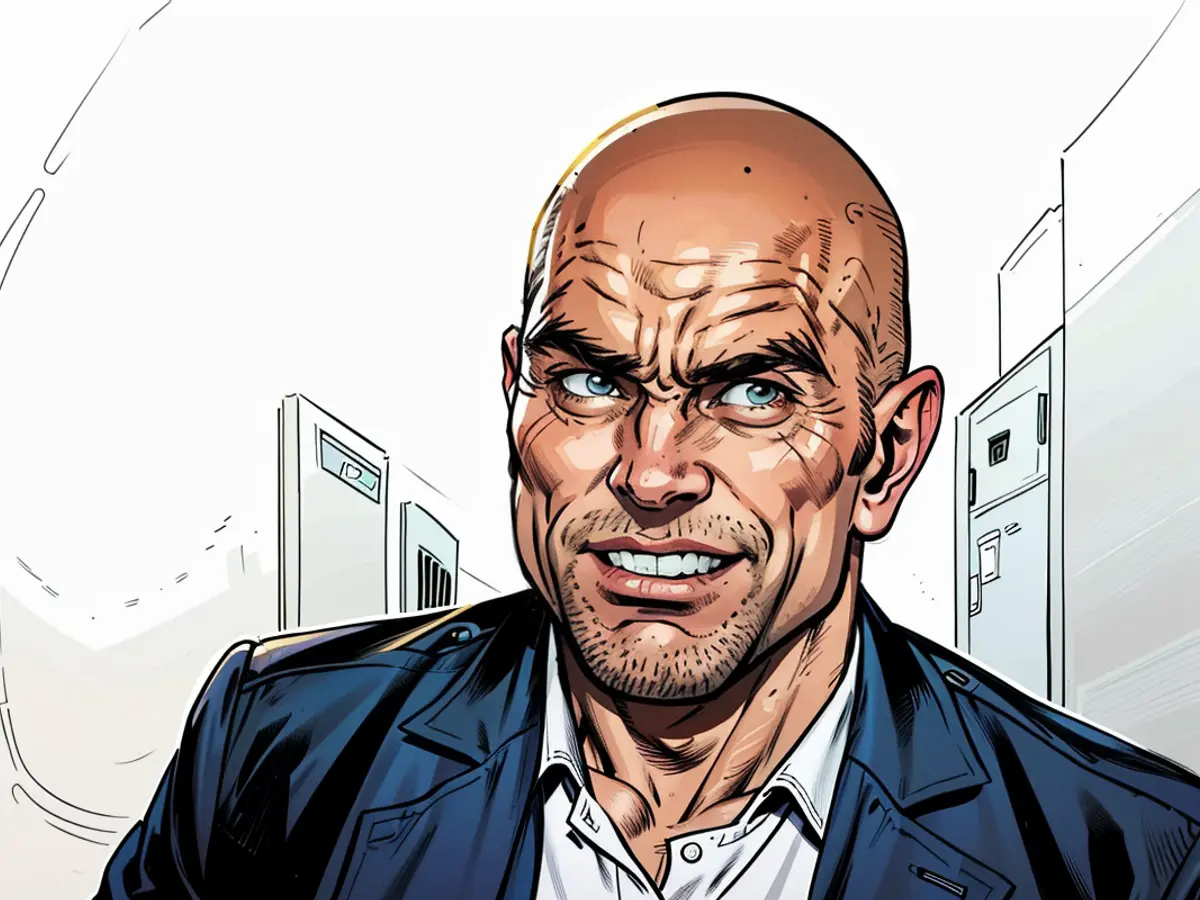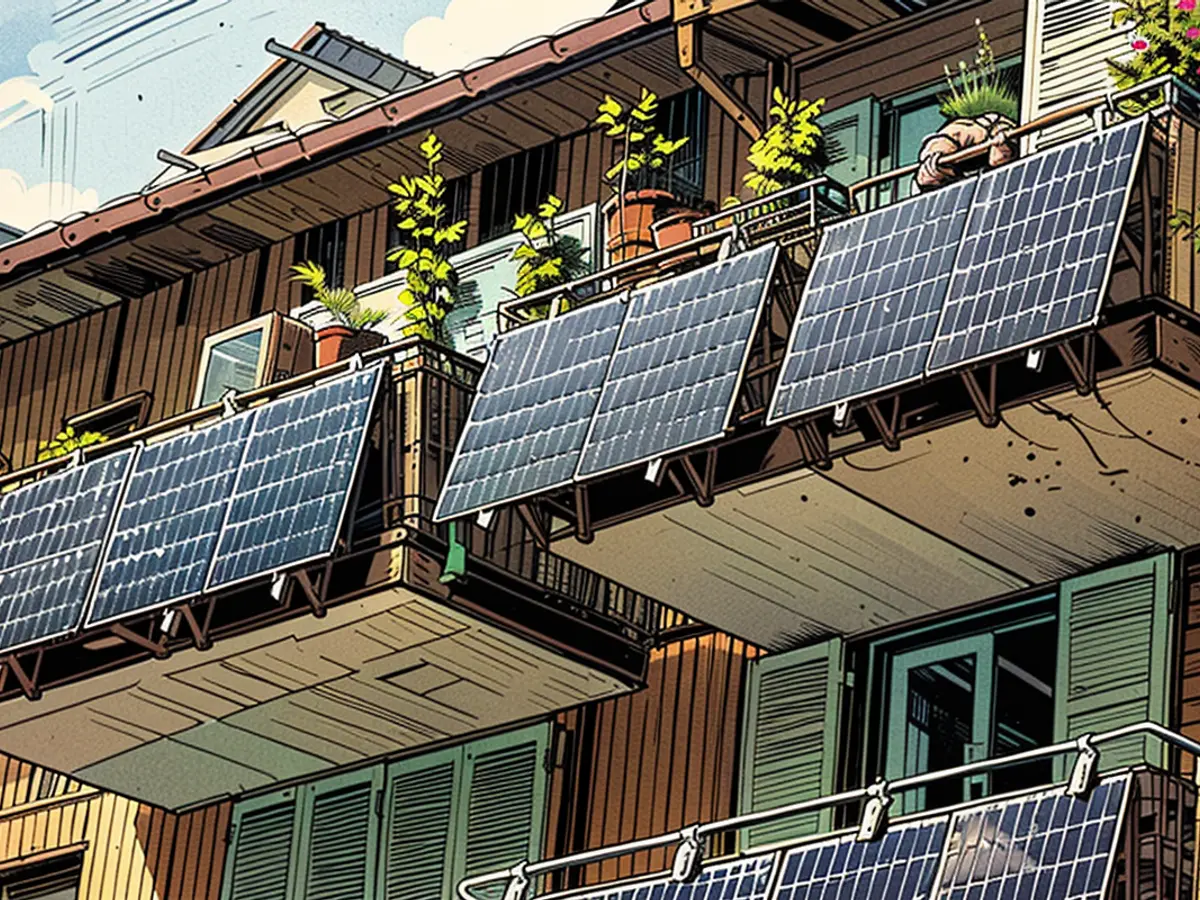"During sunny periods, the abundance of electricity in the power lines surpasses our capacity to manage it effectively"
Germany is seeing a surge in solar energy, but it's becoming an issue, especially in the south with numerous private installations on rooftops and balconies. "On sunny holidays, our networks are currently reaching their limits," says Maik Render, CEO of Nuremberg energy supplier N-Ergie. "Eventually, the circuit breaker will trip." To prevent an overload of solar energy, Render sees two options: "Perhaps we'll need to stop installing solar panels in areas where there are already many of them," he suggests in the "Climate Lab" on ntv. N-Ergie's boss also considers guidelines for the operation of private solar installations, such as limiting the feeding of excess electricity into the network to certain times. "You can't just promote, you also have to regulate sometimes," Render says. "As a municipal company, we say: This connection is missing far too often."
ntv.de: Are you worried about the solar boom?
Maik Render: We need to distinguish between large solar installations next to highways and small ones on individual rooftops. The law allows us to shut down the large installations when there's too much power. But we can't do that with the installations on rooftops.*
Are the rooftop installations causing the overload?
It's not a nationwide issue, but a regional one. Take a region with many houses, all with solar installations. On a sunny Easter Sunday, when no one is using electricity, excess electricity is still being generated.*
Why are holidays the problem? Because people aren't working?
Exactly. During the day, when the sun is shining, industry is at a standstill and power consumption is low. On such days, there's a surplus of electricity in the grid, which we don't know what to do with.*
Is this a prediction or is it happening already?
On sunny days, our networks are already reaching their limits today. There's not much room in the system. So we have to take technical measures now, because the more uncontrollable installations are built, the more difficult it will be.*
Will power outages occur?
A power circuit is balanced when as much power is fed in as is taken out. But if too much power is fed into the circuit, the fuse will blow. Think of an extension cord: If used for a long time, especially with a hair dryer, and left coiled up, the cord will eventually get so hot that the thermal fuse trips. The same thing happens with solar installations: If there's no more capacity in the network, the lines get too warm and fuses blow. It's not a blackout, but there's no power for a time.*
Will the problem be exacerbated by the boom in balcony power plants?
Yes. In electricity, consumption and production are always in balance. But in the new system, electricity is produced during the day and consumed in the evening. The power grid is not ready for this.*
Isn't the private solar boom generally beneficial, though? Or would you disagree?
At N-Ergie, we believe in the energy transition. But a conventional power plant runs about 6000 hours a year, while the sun shines for about 1000 hours. To replace our power plant fleet, we would need a solar park six times as large. We have built a lot, but it's nowhere near enough to become fossil-free. However, we must be careful when expanding. In the past, power plants were concentrated near cities, while solar installations are distributed across the area. If we build too many in individual regions, we will need the corresponding networks there. If these are not available, the fuses will blow. Therefore, we must build storage and networks and perhaps also say: We will no longer build solar panels where there is already a lot of it.*
Should the promotion be directed towards regions with little solar power and towards promoting network expansion in areas with a lot of it?
For example, but in Bavaria, this is a widespread problem. You can't say that more solar expansion is needed in Würzburg or Kitzingen, and less in Sulzbach-Rosenberg.*
Should private households that have already installed solar systems consider a storage solution?
PV systems and storage are usually installed together. However, the battery does not work in a grid-friendly manner, but only helps the house, because: the sun comes up at 8 am. Initial electricity consumption is low, because people go to work and children go to school. When solar radiation is strongest at 11 am, the battery is already full. For the grid, it would be better if the battery were charged in the morning and discharged in the evening. However, the homeowner is not interested in that. They want to be secure in case a cloud field passes by at 12 pm. This is the problem: Technically, local storage could help the grid during important hours, but there is currently no incentive for homeowners to do so.
Given the lack of grid-compatible energy storage, would you like to have the ability to turn off balcony power plants and solar panels on nearby buildings in crisis situations from Nuremberg?
Legally, we can execute this in specific situations, particularly for mid-scale installations on farms. However, as an energy provider, we prefer to transmit electricity rather than switch off installations. Thus, we strive to regulate such that the existing storage serves not only the household but also the grids. This necessitates a financial incentive since currently, grid-friendly behavior isn't financially beneficial for homeowners. They derive most benefits by charging the battery at the lowest cost and utilizing the electricity themselves later.
How might this regulation manifest? Because many homeowners acquire a solar system and storage for self-sufficiency themselves.
The expansion of storage could be offset against network fees. As an energy provider, we could construct storage that absorbs electricity during the sunniest hours. Currently, these aren't compensated, despite preventing dark neighborhoods or electricity waste. Alternatively, we could acknowledge that one can't solely promote but also sometimes necessitate and impose conditions: You can indeed be self-sufficient, yet between 11 am and 3 pm, your storage mustn't feed electricity into the grid, but absorb it in a grid-compatible manner.
This is a sensitive political topic. People have obtained a PV system to sustain the energy shift, and suddenly, they are being told how to utilize it.
We often discuss the energy shift in technological terms, but today, let's explore a financial one: who pays what and when? Most Germans can't afford to buy a solar panel system because they don't own a home. This privilege is reserved for homeowners, who have been subsidized and lowered their electricity costs for two decades. Why can't I make them contribute to the overall system? In Nuremberg, there's a neighborhood called Langwasser, where, exaggeratedly, 20,000 people live in ten buildings. None of them can benefit from the subsidy. I personally would dislike that, but as a municipal company, we say: this connection between supporting and demanding is missing too often.
Really? The burdens are currently unequally distributed?
The allocation of burdens will be a pivotal question in the energy shift, I'm certain of that. There's social consensus that we don't wish to burn oil and gas anymore. However, it's difficult when we subsidize homeowners but not tenants. At least half of the population cannot participate in this system. This creates social tension and dissatisfaction. We must confront these uncomfortable truths.
Clara Pfeffer and Christian Herrmann spoke with Maik Render. The conversation has been edited for better comprehension and smoothness. You can listen to the full conversation in the podcast "Climate Lab"**.
Given the high number of solar installations in Bavaria, it might be necessary to consider limiting the installation of new solar panels in areas with a high density of existing installations, as suggested by Maik Render. This could help prevent an overload of solar energy and prevent the tripping of circuit breakers.
In regions like Bavaria, where many houses have solar installations, excess electricity is still generated on sunny holidays when electricity consumption is low. This surplus of electricity can put strain on the power grid, leading to technical issues such as overheated lines and blown fuses.









